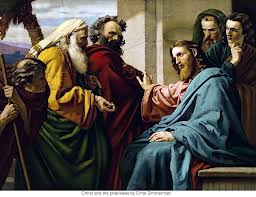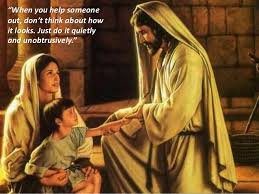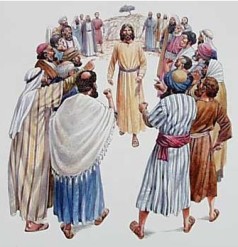
– 30th January 2022 –
Gospel reading: Luke 4:21-30
vs.21 Jesus began to speak in the synagogue:
“This text is being fulfilled today even as you listen.”
vs.22 And he won the approval of all, and they were astonished by the gracious words that came from his lips. They said, “This is Joseph’s son, surely?”
vs.23 But he replied,
“No doubt you will quote me the saying, ‘Physician, heal yourself’ and tell me, ‘We have heard all that happened in Capernaum, do the same here in your own countryside.’”
vs.24 And he went on, “I tell you solemnly, no prophet is ever accepted in his own country.
vs.25 There were many widows in Israel, I can assure you, in Elijah’s day, when heaven remained shut for three years and six months and a great famine raged throughout the land,
vs.26 but Elijah was not sent to any one of these; he was sent to a widow at Zarephath, a Sidonian town.
vs.27 And in the prophet Elisha’s time there were many lepers in Israel, but none of these was cured, except the Syrian, Naaman.”
vs.28 When they heard this everyone in the synagogue was enraged.
vs.29 They sprang to their feet and hustled him out of the town; and they took him up to the brow of the hill their town was built on, intending to throw him down the cliff,
vs.30 but he slipped through the crowd and walked away.
***************************************************
We have four commentators available from whom you may wish to choose .
Michel DeVerteuil : A Trinidadian Holy Ghost Priest, Formar director of the Centre of Biblical renewal .
Thomas O’Loughlin: Professor of Historical Theology, University of Nothampton.
Sean Goan: Studied scripture in Rome, Jerusalem and Chicago and teaches at Blackrock College and works with Le Chéile
Donal Neary SJ: Editor of The Sacred Heart Messenger and National Director of The Apostleship of Prayer.
****************************************
Michel DeVerteuil
Lectio Divina with the Sunday Gospels
www.columba.ie
General comments
The incident related in today’s gospel story is a precious moment of grace for the people of Nazareth, one that we too experience from time to time – Jesus invites them and us to stop hiding behind their false identity and come to the truth of themselves.
We all need to feel special; the problem is how we go about fulfilling that need. The easy – but false – way is to take the short cut of finding our “specialness” in belonging to a group that considers itself superior to others. We find our “specialness” in our sex, race, colour, ethnic origin, nationality, or from the fact that we are married, are “old boys” or “old girls” of some school, university graduates, have a job, or own our homes.
 Today’s reading reminds us that the same happens with religious groups. The people of Nazara, like the Jews in general, like members of churches, or of groups within them such as priests, religious and leaders of prayer groups, look on themselves as “the chosen people”.
Today’s reading reminds us that the same happens with religious groups. The people of Nazara, like the Jews in general, like members of churches, or of groups within them such as priests, religious and leaders of prayer groups, look on themselves as “the chosen people”.
The basic fault in all these situations is to forget that being part of a group says nothing about our personal worth. If we settle for the group-identity we become complacent and stop facing the truth about ourselves.
The moment of grace comes when someone from our group sees through the cover up, starts mixing with outsiders, and declares that some of them are every bit as good as we are, perhaps even better. A good Catholic boy marries a girl from a different faith, and comes back to say that his in-laws are just as holy as members of his church. One of our own children, perhaps in a moment of anger, shows up our double standards and compares us unfavourably with our neighbours.
We think of those who refuse to play the racial game in politics, business or sport, and criticise members of their own religious or ethnic group. At the world level, Pope John Paul asks forgiveness for the sins of the church, Gandhi refers to the dalits as God’s special children, Nelson Mandela forgives the former rulers of South Africa.
Our spontaneous reaction may be to be angry with those who break ranks. We brand them “traitors.” Our anger is understandable. We are suddenly faced with the reality that we are not “a master race”, “born to rule”, “chosen people”; we must take our place alongside people that we considered inferior, admit our failings, work hard for success.
In the church, all of us – priests, religious, laity – realise that we must “work for our salvation with fear and trembling”.
The person moves on and leaves us to ponder this painful but very important moment of truth. Very gradually, over a period of months perhaps, the truth sets us free. Our anger turns to gratitude, we thank God that the Jesus-person he sent us did not flinch before our anger, but slipped away quietly leaving us to move from a false identity and find our true selves. We are all special to God
Prayer reflection
Lord, we thank you that every once in a way you send us people like Jesus
who shock us by showing us that we have been hiding
behind the identity of the group we belong to.
They remind us of people who don’t belong to our group, whom you have blessed,
a humble widow who was visited by a great prophet,
the leader of a different religious group whom you healed miraculously
while we were left with our diseases.
It is a painful lesson, especially when it comes from someone within our own household, and we exclaim, ‘This is Joseph’s son, surely, what right has he to be teaching us?’
and we exclaim, ‘This is Joseph’s son, surely, what right has he to be teaching us?’
But it is a moment of grace;
we realise that we must stop looking down on people of other ethnic groups,
of lesser education than ourselves;
we must join members of other churches, religions and faiths, and unbelievers too,
in asking for your mercy and forgiveness.
Lord, you know that our first response is to become enraged
with those who tell us these home truths,
spring to our feet, hustle them out of our town,
take them up to the brow of the hill our church is built on,
intending to throw them down the cliff.
We thank you that the Jesus you sent us slipped out of our grasp and walked away,
leaving us to ponder on the truth,
experience that the Bible was being fulfilled even as we listened,
and we eventually found life from the gracious words that came from his lips.
*******************************************
Thomas O’Loughlin
Liturgical Resources for the Year of Matthew
www.columba.ie
Introduction to the Celebration
Jesus announced the new covenant in a gathering of the People of God assembled to praise God and to reflect on God’s message for their lives. But when Jesus pointed out to them their shortcomings they raged at him and wanted to push him away from them. We have all done this in one way or another  in our lives: we have heard the call to change our lives or to begin changing our world and have wished the call to go away or declared it silly or irrelevant.
in our lives: we have heard the call to change our lives or to begin changing our world and have wished the call to go away or declared it silly or irrelevant.
Let us now spend some moments remembering that we are here because we have heard Jesus’s call to be the people who bring God’s justice to the world and ask pardon for the times we have failed in this vocation.
Homily Notes
1. It is amazing how quickly people can turn from praising someone or something to reviling them or rejecting their ideas. One little word that touches something that is close to us in our selfishness is all it takes. We might talk about the environment and ecology for years, but one little curtailment of our enjoyment – a few extra pennies of tax – and suddenly all the talk about climate change gets forgotten and is dismissed as just more ‘theory’. We see this phenomenon in the gospel: at the start they are all amazed and filled with wonder and praise for a great prophet has arisen and he is one of their own, they even know the family! Then, in a moment, all changes: they are enraged by him, they reject him, and they even want to kill him. But what can get people so annoyed?
2. It is deep within us that our group is the gathering of nice people. We represent civilisation, modernity, and all that is best in the world. We might not be smug as individuals, but group smugness is rarely far away. It is confirmed by the fact that people want to be like us or emigrate to be with us. They recognise that our way of life, our school system, our hospitals, our ways of enjoying ourselves all represent a peak of human achievement.
3. However, there are others in this world. Indeed, when we compare them with ourselves we are shocked at the contrast: we are even brighter and more enlightened than we thought we were, and they are darker, dimmer, and more dangerous. Indeed, the very fact that they are different shows that they are bad and a threat to us and our values. And, if they were to oppose us they are opposing civilisation itself.
4. This sort of reasoning is close to nearly every war that is fought and people who wish to lead by fear rather than by vision always need the wicked other. Once war has broken out, then we are usually fighting for nothing less than civilisation itself! What a burden is laid on us amidst such dangers!

5. We even get smug about religion: if one is in the right camp, then one is OK And, being in the right camp becomes more important than seeking the truth, working for justice, and acting with integrity and mercy. Religious slogans replace wisdom.
6. This is the blind spot that Jesus irritates in this gospel. He has told them the time of God’s justice has come, but they are more interested in seeing will he perform miracles. God’s servants are not confined to any pre-packaged group. Sidonians and Syrians – foreigners – maybe as much in God’s plan as we are. This is not a nice message. It is not a message that comforts us, but one that asks us to examine some of the dangerous ideas of exclusion we harbour. It is a message that asks us to begin building the kingdom of justice, peace and love, rather than simply thinking that we belong to it because of a label we sometimes wear.

**********************************************
Sean Goan
Let the reader understand
www.columba.ie
Gospel
This gospel text begins where we left off last Sunday, with Jesus telling the people in the synagogue in Nazareth that the scriptures are being fulfilled in their hearing. Their initial positive response to him augurs well but change in attitude comes quickly as it becomes apparent that Jesus is not interested in popular acclaim but in repentance. He reminds his hearers of two occasions in the Old Testament when God used the prophets Elijah and Elisha to assist foreigners at a time when his own people were in need. The people of Nazareth were more interested in what Jesus could do for them than in what he might be asking of them.

Reflection
‘Today’ the scriptures are again being fulfilled in our hearing. The word of God is alive and active and invites us to ponder where and how God is at work in the daily circumstances of our lives. It is always a word that saves and heals but if we are not ready to be challenged by it then we can either deceive ourselves by pretending it is what we want or we can just reject it. That was the situation of the people in Nazareth, and today, like them, we must ask ourselves if we really want what God wants – that is what repentance is all about.
**************************
Donal Neary SJ
Gospel Reflections Year C
www.messenger.ie/bookshop
4th SUNDAY IN ORDINARY TIME
Christian Love
‘God, that’s very true’ – a remark at our liturgy meeting after the second reading. Jealousy kills, envy too, and isn’t it great to rejoice in the good fortune of another?
Love is what we bring with us at the end of life. ‘We will be judged in the evening of life by love (St John of the Cross). Love for those near and far, for love in the gospel is more than love for just the family, the friend, the attractive one, the neighbour, for all.
There are different calls to Christian love – near and dear daily love, friendship, marriage, relationships. The wider world like in our job where we live in a loving way, in justice with all, not using others for personal gain; the wider world where a universal love makes me want to make a difference in the bigger world. Love carries us into wide seas and waters. It involves us with everyone. It obviously doesn’t mean we relate to everyone – nor that we even like everyone. Love is when others’ lives become at least as important as our own; and in the deepest loves like marriage, family, and often friendship, others’ lives become even more important.
Love changes – we look back and see how the people we loved make the difference. Life is too short to look love in the face and say no.’ We are moulded and remoulded by those who have loved us, and though their love may pass, we are nevertheless their work’ (F. Mauriac).
The second reading today is hard to beat! We see it in action when we look at the life of Jesus.

Jesus whose heart is wide enough to love us all,
make our hearts like yours.